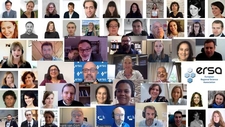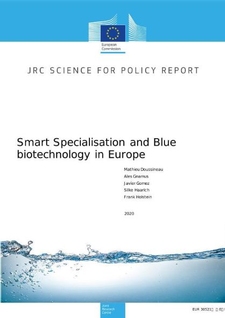
|
S3 Newsletter
|
|
Joint Research Centre
|
|

|
 
|
 |
|
In this issue
- February 2021
|
 |
|
|
|
|
|
 |
|
  |
|
|
S3 Platform

|
|
 |
|
Highlights
|
|
Fostering environment-oriented activities through S3 – Results from the call for contributions
|
|
The results from the call for contributions launched by the S3 Platform are now available. The 10 selected cases highlight how stakeholders across Europe are using the Smart Specialisation concept to develop their own innovation-driven economic transformation agendas at various territorial levels, with a specific emphasis on environment-oriented activities. They provide useful information on the role played either by the governance, and/or stakeholders’ involvement in the Entrepreneurial Discovery Process, and/or Monitoring and Evaluation mechanisms to foster the implementation of green activities, with a brief description of the policy tools and measures that are developed in this context. In the selection process, particular attention was given to the territorial balance, to boost its potential relevance to different types of territories.
|
|
Read more...
|
|
|
|

|
 |
|
 |
|
General Information
|
|
First European Digital Innovation Hubs online Conference
|
|
More than 2.000 people from across Europe participated in the first annual European Digital Innovation Hubs Conference. Since 2016, the European Commission has supported the creation of Digital Innovation Hubs (DIH) and is now gearing up support to the digitalisation of Europe's economy and society with the creation of a pan-European network of Digital Innovation Hubs (EDIHs). This network will support SMEs and public sector in their digital transformation including on how to benefit from very advanced technologies such as: AI, HPC, Cybersecurity and more. More than 20 parallel sessions provided inspiring keynote speeches and fostered participatory discussions. Within the Joint Research Centre, a dedicated team of the S3 Platform has been working for the last three years on supporting synergies and the territorial dimension of DIHs within Smart Specialisation innovation ecosystems.
|
|
Read more...
|
|
|
|

|
|
ERSA-JRC Winter School 2021
|
|
The European Regional Science Association in collaboration with the Joint Research Centre (Seville) had organised a Winter School featuring "Smart specialisation: linking global challenges to local implementation". Given the evolving nature of S3, it offers a unique entry point on how territorial policies can provide solutions to grand challenges in a way that lead to transformation of places that become more resilient by adapting to social, economic and environmental changes. The winter school provided PhD/Post-doc Students and young researchers with the very latest advances in regional science on the topic of place-based policies and social, economic and climate challenges.
|
|
Read more...
|
|

|
|
STOA Workshop: Exploring synergies between Horizon Europe and regional policy
|
|
The European Structural and Investment Funds (ESIFs) and Horizon Europe, when operating individually, provide significant support for research, development, and innovation. Supporting synergies in their use and implementation may deliver additional gains in terms of innovation results, close the innovation gap in Europe, and promote economic growth. The presentation from Mikel Landabaso Alvarez, Director of the Seville site of the Joint Research Centre of the European Commission and the video of the event that was held on 2d February 2021 are now available.
|
|
Read more...
|
|
 |
|
 |
|
Announcement
|
|
Survey: How has the COVID-19 pandemic affected RIS3 management and activities?
|
|
The Territorial Development Unit of the Joint Research Centre (JRC) has developed a survey aimed to understand the impact of the COVID-19 pandemic on RIS3 management and activities. The institutions in charge of the design and implementation of regional and national RIS3 are sent the link to the survey and are encouraged to take part in it.
|
|
|
|

|
|
Technical Assistance Facility (TAF)
|
|
To help applicants better prepare for Technical Assistance Facility (TAF) selection rounds in 2021, a second call for expressions of interest for one-on-one pre-application expert assistance for S3P-Industry investment projects is launched. The purpose of this one-day consultation held by a business expert is to offer further guidelines on how to improve the quality of information provided in the application form. This assistance is addressed to prospective applicants as well as to project promoters who consider re-applying for TAF. Stakeholders can submit their expression of interest by the 12th of February 2021 to receive support.
|
|
Read more...
|
|

|
 |
|
 |
|
S3 Publications
|
|
An intervention-logic approach for the design and implementation of S3 strategies
|
|
Smart specialisation is conceptualised as research and innovation policymaking encompassed in a holistic place-based view of development. It combines an organisational bottom-up approach with a structural approach, stressing interactions among local and international actors that participate and facilitate reflexive learning processes. The issue of governance is key and multi-level governance is instrumental for advancing with the goal of the strategy on the ground. The need to connect top-down EU policies with place-based facts and ambitions that translate into competitive advantage, generating growth and jobs, makes governance the cornerstone of the smart specialisation process. In the context of the revision of the existing strategies, the need to reassess the coherence of policy intervention is of crucial importance to address the local but also the global challenges faced by EU territories.
|
|
Read more...
|
|

|
|
Smart Specialisation and Blue biotechnology in Europe
|
|
In May 2019, DG MARE and the JRC published its Blue economy Report that focuses on boosting a “blue” economy, the sustainable use of ocean resources for economic growth, through entrepreneurship, investment, and research and innovation. In order to better understand and illustrate the new opportunities coming from the Blue economy, this report introduces the emergent sector of Blue biotechnology, ant its reference in the Smart Specialisation Strategies of 12 countries and 53 regions in the EU. A comprehensive screening of EU supported interventions in the current 2014-2020 funding period showed that € 238.6 million of EU funds have been invested in 182 projects and initiatives related to Blue biotechnology with a total budget of EUR 336 million. Smart Specialisation Strategies represent a policy instrument that favours the discovery of innovation potential, also in the Blue biotechnology.
|
|
Read more...
|
|

|
|
Interregional Cooperation and Smart Specialisation: a Lagging Regions Perspective
|
|
Produced as part of the JRC Lagging Regions project, this report explores the nature and extent of mutual reinforcement between interregional collaboration and Smart Specialisation in a selection of lagging regions drawing on a survey, case studies, and events. It examines the specific challenges of interregional and international cooperation, as well as potential benefits and opportunities, that are relevant for low-growth and low-income regions.
|
|
Read more...
|
|
|
From Digital Innovation to "Smart Tourism destination": Stakeholders' reflections in times of a pandemic
|
|
This JRC policy insight presents the main findings of an online event that took place on 30th September and 8th October 2020, organised by the Portuguese’s Algarve Region and the JRC. The workshop aimed to support the Entrepreneurial Discovery Process EDP, a key feature of Smart Specialisation. 65 stakeholders participated in the event to discuss challenges, opportunities and needs of the region in the field of the digitalisation of tourism. Lack of adequate skills, inadequate infrastructure, weak links between tourism services and others economic activities and ineffective data collection and analysis were some of bottlenecks discussed. Regional assets, new market trends and the advantage of big data analysis were the main opportunities identified.
|
|
Read more...
|
|
|
S3 in sub-Saharan Africa: Opportunities, challenges and initial mapping for Côte d’Ivoire
|
|
This article discusses the opportunities and challenges for the uptake of Smart Specialisation Strategies (S3) in sub-Saharan African contexts. It applies the initial S3 mapping to the case of Côte d'Ivoire, one of the largest economies in the West African region. The integration of smart specialisation principles into STI and industrial policymaking can indeed open several opportunities to identify and nurture innovative activities and novel industries. Pragmatic recommendations are drawn for more effective innovation-based local development strategies in Côte d’Ivoire and the region.
|
|
Read more...
|
|

|
 |
|
|
|










